The AMD 2nd Gen Ryzen Deep Dive: The 2700X, 2700, 2600X, and 2600 Tested
by Ian Cutress on April 19, 2018 9:00 AM ESTCPU Rendering Tests
Rendering tests are a long-time favorite of reviewers and benchmarkers, as the code used by rendering packages is usually highly optimized to squeeze every little bit of performance out. Sometimes rendering programs end up being heavily memory dependent as well - when you have that many threads flying about with a ton of data, having low latency memory can be key to everything. Here we take a few of the usual rendering packages under Windows 10, as well as a few new interesting benchmarks.
All of our benchmark results can also be found in our benchmark engine, Bench.
Corona 1.3: link
Corona is a standalone package designed to assist software like 3ds Max and Maya with photorealism via ray tracing. It's simple - shoot rays, get pixels. OK, it's more complicated than that, but the benchmark renders a fixed scene six times and offers results in terms of time and rays per second. The official benchmark tables list user submitted results in terms of time, however I feel rays per second is a better metric (in general, scores where higher is better seem to be easier to explain anyway). Corona likes to pile on the threads, so the results end up being very staggered based on thread count.
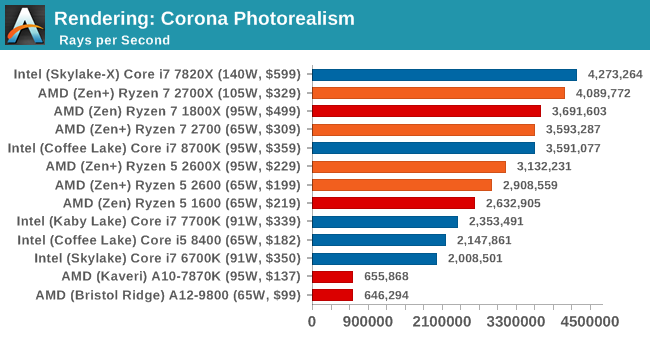
Blender 2.78: link
For a render that has been around for what seems like ages, Blender is still a highly popular tool. We managed to wrap up a standard workload into the February 5 nightly build of Blender and measure the time it takes to render the first frame of the scene. Being one of the bigger open source tools out there, it means both AMD and Intel work actively to help improve the codebase, for better or for worse on their own/each other's microarchitecture.
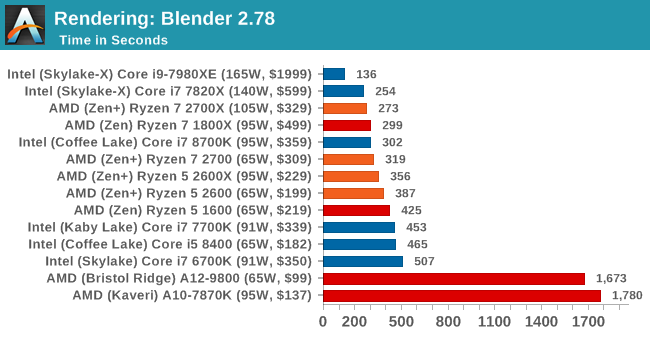
This is one multi-threaded test where the 8-core Skylake-based Intel processor wins against the new AMD Ryzen 7 2700X; the variable threaded nature of Blender means that the mesh architecture and memory bandwidth work well here. On a price/parity comparison, the Ryzen 7 2700X easily takes the win from the top performers. Users with the Core i7-6700K are being easily beaten by the Ryzen 5 2600.
LuxMark v3.1: Link
As a synthetic, LuxMark might come across as somewhat arbitrary as a renderer, given that it's mainly used to test GPUs, but it does offer both an OpenCL and a standard C++ mode. In this instance, aside from seeing the comparison in each coding mode for cores and IPC, we also get to see the difference in performance moving from a C++ based code-stack to an OpenCL one with a CPU as the main host.
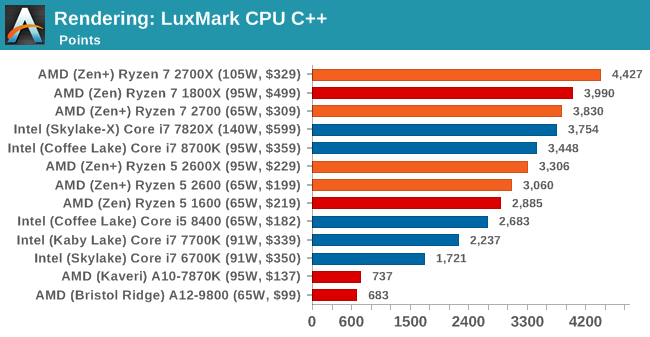
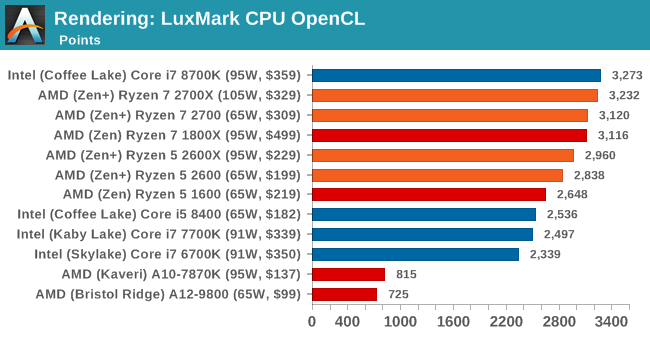
POV-Ray 3.7.1b4: link
Another regular benchmark in most suites, POV-Ray is another ray-tracer but has been around for many years. It just so happens that during the run up to AMD's Ryzen launch, the code base started to get active again with developers making changes to the code and pushing out updates. Our version and benchmarking started just before that was happening, but given time we will see where the POV-Ray code ends up and adjust in due course.

Cinebench R15: link
The latest version of CineBench has also become one of those 'used everywhere' benchmarks, particularly as an indicator of single thread performance. High IPC and high frequency gives performance in ST, whereas having good scaling and many cores is where the MT test wins out.
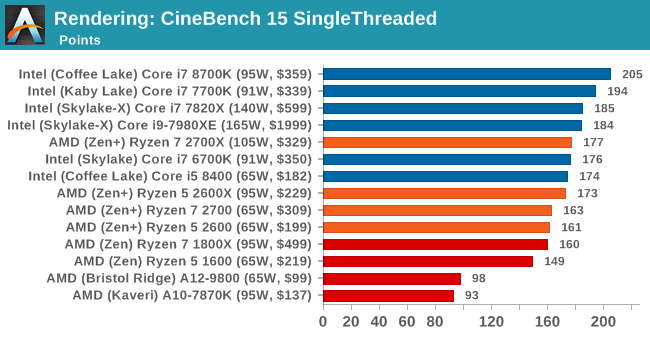
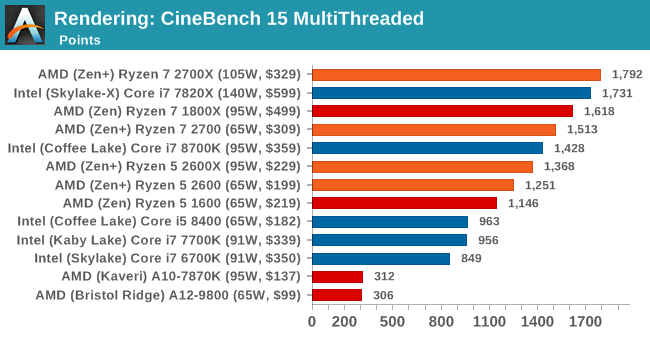
Intel is still the single thread champion in benchmarks like CineBench, but it would appear that the Ryzen 7 2700X is now taking the lead in the multithreaded test.










545 Comments
View All Comments
danjw - Friday, April 20, 2018 - link
They Anandtech used the rated speeds that the processors were stated to support by the manufactures. Anandtech, is using everything at stock. Anandtech ran all the processors through fully patched systems (both bios and OS). Not every website other tests to these same methodology. So, there will be differences in their results. None the less, Anandtech, is auditing their results to double check them. I really don't think they are going to see anything wrong. Toms, ran their Intel parts without the latest bios updates. Others overclocked their systems.Most users do not overclock their systems. Sure, a lot of us readers do, but not everyone. I overclock my systems, but, my two brothers who are both just as technical as I am, do not. It is a choice some make and others do not. The majority of users do not overclock. So, Anandtech does not overclock in their most reviews. They have at times in the past and may in the future include overclocking results in reviews, but they have are always broken out the overclocking results in a separate section and/or labeled the overclocked results to differentiate them from the standard clocked results. These are editorial choices that Anandtech makes, I don't see any problem with that.
Luckz - Monday, April 23, 2018 - link
Intel for some reason have 4 memory sticks. Weird idea.werpu - Friday, April 20, 2018 - link
Well the main difference is they tested against fully meltdown and specte patched systems, which in fact is the norm, while all other reviewers simply tested against bare metal. It is known that Intel took a pretty serious hit especially with Meltdown and a more serious hit with Spectre compared to AMD which did not have meltdown at all and to a lesser degree Spectre than Intel did.I would say Anandtechs tests are spot on.
And this reflects the sad state of nowadays performance testing which seems to be done to 99.9% by incompetent idiots or fanboys (especially the youtubers are the worst)
However in extreme situations Intel again wins since the 8700k can be oced by decapping and good cooling to 5GHz while the OC capabilities of the 2700x are basically non existent. It really depends, which is better. But the performance gap is closing and in non OCed system it is not existent anymore. It will be interesting next year when AMD has moved to 7nm while Intel still will be stuck at 10nm which they currently try to pull it but not have yet managed. Then the game might be entirely reversed.
Alphasoldier - Friday, April 20, 2018 - link
Unfortunatelly, you are the only idiot and fanboy here. Pretty much everyone stated in their reviews, the system were fully patched, all cpus were reused and everything was retested, because AMD fanboys were screaming Meltdown here, Spectre there.Now, the internet is full of this garbage review, it spreads like cancer, because AMD fanboys have nothing better to do, once again they are disappointed that 6 cores from Intel outperformed 8 cores from AMD and they are now like the Liverpool fans repeating "The next year will be ours"
But at least they got some fancy RBG cooler.
Fallen Kell - Friday, April 20, 2018 - link
Alphasoldier, I've been reading the reviews, and while many have stated they have applied the software (OS) patches, very few have stated they applied both the software and BIOS patches for the Spectre variant 2. Thew few places that I have seen which have stated both the software and BIOS patches were applied all seem to be showing much more similar results as the AT article.In anycase, Ryan stated they are looking into it, and I am certain we will see an update within the next few days. And don't come saying that I am a AMD fanboi, I havn't purchased a AMD CPU since the Thunderbird (i.e. a slot A CPU).
mapesdhs - Saturday, April 21, 2018 - link
werpu, oc an 8700K to 5GHz? Makes me laugh that a 300MHz bump over a CPU's max single core turbo is even called an oc these days. Sheesh, it's a far cry from the days of SB, oc hardly seems worth bothering with now.mkaibear - Thursday, April 19, 2018 - link
It's here, it's here!Dr. Swag - Thursday, April 19, 2018 - link
What is with the gaming benchmarks? On your tests the whole ryzen 2 series is a step above everything else, but all other reviews show it between ryzen and coffee lake...fallaha56 - Thursday, April 19, 2018 - link
This is the Spectre2 patch effectNot looking great for Intel and HFR gaming
Ryan Smith - Thursday, April 19, 2018 - link
"What is with the gaming benchmarks?"We're looking into it right now. Some of these results weren't in until very recently, so we're going back and doing some additional validation and logging to see if we can get to the bottom of this.